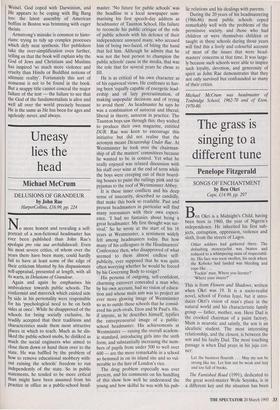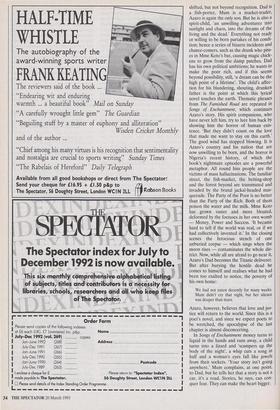The grass is singing to a different tune
Penelope Fitzgerald
SONGS OF ENCHANTMENT by Ben Okri Cape, £14.99, pp. 297 Ben Okri is a Midnight's Child, having been born in 1960, the year of Nigeria's independence. He inherited his first sub- jects, corruption, oppression, violence and sloth, from the streets of Lagos.
Other soldiers had gathered there. The defaulting motorcyclist was beaten and reduced to a whimpering mass of respectabil- ity. His face was soon swollen, his neck where the Koboko had landed was bleeding and rope-like ...
Tuckin' man. Where you licence?'
`Where your insure?'
This is from Flowers and Shadows, written when Okri was 19. It is a socio-realist novel, school of Festus Iyayi, but it intro- duces Okri's vision of man's place in the natural world and his characteristic family group — father, mother, son. Here Dad is the crooked chairman of a paint factory, Mum is neurotic and saintly, the son is an idealistic student. The most interesting relationship, and the closest, is between the son and his faulty Dad. The most touching passage is when Dad prays in his juju cor- ner:
Let the business flourish . . . May my son be strong like me. Let him not be weak and lazy and too full of books.
The Famished Road (1991), dedicated to the great word-master Wole Soyinka, is in a different key and the situation has been shifted, but not beyond recognition. Dad is a fish-porter, Mum is a market-trader, Azaro is again the only son. But he is also a spirit-child, 'an unwilling adventurer into sunlight and chaos, into the dreams of the living and the dead.' Everything not ready or willing to be born partakes of his condi- tion; hence a series of bizarre incidents and chance-comers, such as the drunk who piss- es in Mme Koto's bar, causing magic chick- ens to grow from the damp patches. Dad has his own political ambitions; he wants to make the poor rich, and if this seems beyond possibility, still, 'a dream can be the high point of a lifetime'. The child's affec- tion for his blundering, shouting, drunken father is the point at which this lyrical novel touches the earth. Thematic phrases from The Famished Road are repeated in Songs of Enchantment, which continues Azaro's story. His spirit companions, who have never left him, try to lure him back by showing him the horror of human exis- tence. 'But they didn't count on the love that made me want to stay on this earth.' The good wind has stopped blowing. It is Azaro's country and his nation that are now unwilling to be born, and the horror is Nigeria's recent history, of which the book's nightmare episodes are a powerful metaphor. All round him people are the victims of mass hallucinations. The familiar street, the fish-market, the betting-shop and the forest beyond are transmuted and invaded by the brutal jackal-headed mas- querade. The Party of the Poor is no better than the Party of the Rich. Both of them poison the water and the milk. Mme Koto has grown vaster and more bloated, deformed by the foetuses in her own womb — Money, Power and Success. 'It became hard to tell if the world was real, or if we had collectively invented it.' In the closing scenes the ferocious stench of one unburied corpse — which sings when the moon rises — contaminates the whole dis- trict. Now, while all are afraid to go near it, Azaro's Dad becomes the Titanic deliverer. But after burying the hostile dead he comes to himself and realises what he had been too exalted to notice, the poverty of his own home: We had not eaten decently for many weeks. Mum didn't cry that night, but her silence was deeper than tears.
Azaro, however, believes that love and jus- tice will return to the world. Since this is a poet's novel, and since we expect poets to be wretched, the apocalypse of the last chapter is almost disconcerting.
In Songs of Enchantment money turns to liquid in the hands and runs away, a child turns into a lizard and 'scampers up the body of the night', a whip cuts a song in half and a woman's eyes fall like jewels from their sockets. 'Your story isn't going anywhere,' Mum complains, at one point, to Dad, but he tells her that a story is not a car, it's a road. Stories, he says, can con- quer fear. They can make the heart bigger.



























































 Previous page
Previous page